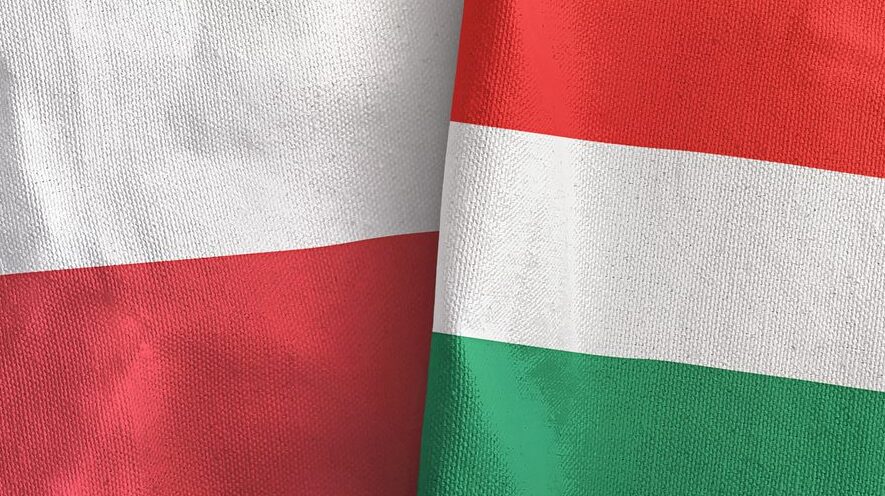
Ukraine’s hostility towards Central European countries and French-German plans to reform the European Union could bring Hungary and Poland closer together despite recent tensions between the two countries on the issue of Ukraine, according to Hungarian and Polish Members of the European Parliament.
“If Law and Justice (PiS) wins the election and remains in power, it could potentially lead to improved relations between Poland and Hungary. Both countries have had similar stances on various EU policies, such as opposing mandatory migrant quotas and a preference for preserving national sovereignty,” MEP Ryszard Czarnecki of the Polish governing party, PiS, told The European Conservative.
Poland is preparing for parliamentary elections in less than two weeks’ time, on October 15th, and the conservative PiS, which has governed the country since 2015, is expected to remain in power. Their main rivals are the centrist-liberal Civic Platform (PO), whose leader, former Prime Minister and President of the European Council, Donald Tusk, has been accused by PiS of defending the interests of the EU, and Germany, with whom he had a strong relationship during his tenure as prime minister.
Just like the conservative Hungarian governing party Fidesz, PiS has also been harshly criticised by Western liberals and EU institutions for allegedly breaching the rule of law at home and not adhering to EU ‘values.’ The two countries have angered the EU with their sovereigntist approach and their no-nonsense, conservative stance on issues such as migration and gender ideology. It is no wonder that the two renegade countries are the only EU members not to have received their share of EU recovery funds.
Poland’s relationship with Germany has particularly soured in recent weeks, as the leftist-liberal government in Berlin announced the reintroduction of border controls on its border with Poland to combat illegal migration. Poland and Hungary are also not happy with attempts by Germany and France to reform the EU, which would introduce qualified majority voting, taking away member states’ veto rights on most issues. According to Ryszard Czarnecki:
This suggests that they are seeking to reduce the influence of individual member states in certain areas of EU decision-making. This dangerous reform would not only be a disaster for member states like Poland, Hungary, or the Czech Republic, but also [for] the fundamentals of the European project. The EU is strong when every country feels it is truly participating in decision-making.
Balázs Hidvéghi, MEP for Fidesz, told The European Conservative:
Every effort to centralise the EU contradicts Hungarian national interests. We are not interested in the EU becoming an empire, but in an EU that is based on equality between its member states.
The proposed reform has recently been mentioned in conjunction with a plot to “overthrow” the PiS government. As we previously reported, a pro-government Polish journalist, Dominica Cosic and former Prime Minister Beata Szydło both spoke of a Franco-German plan to change EU treaties and to fast-track Ukrainian EU accession in exchange for Kyiv’s help in changing the government in Poland. Ukraine’s ministry of foreign affairs has denied the allegations.
However, Ryszard Czarnecki doesn’t rule out such a scenario, stating that Germany previously blocked the EU accession of Western Balkan nations but is now willing to open the door for Ukraine. With regards to the allegations made against Germany, Balázs Hidvéghi says:
Unfortunately, external meddling in domestic political affairs, with Brussels and some member states intent on influencing the outcome of elections in other member states, is becoming common practice. We have experienced this in Hungary. It is also a fact that Brussels doesn’t like governments and political parties which say no to EU demands that threaten our national sovereignty. Poland is due to have elections, and the stakes are high. The allegations against Kyiv are serious and and should be clarified.
Poland has been one of Ukraine’s staunchest allies within the EU and NATO since the invasion of the country by Russia last February. Poland has provided military assistance and welcomed millions of Ukrainian refugees, but the relationship has been bitter since Poland refused the import of Ukrainian grain in defence of its own farmers and Kyiv sued Warsaw, Budapest, and Bratislava at the World Trade Organization.
Polish Foreign Affairs Minister Zbigniew Rau claimed on Monday, October 2nd, that part of the reason for his absence at the EU foreign ministers’ in Kyiv was a “downturn” in Polish-Ukrainian relations. Prime Minister Mateusz Morawiecki also criticised Ukrainian President Volodymyr Zelensky for saying that Central European nations are “helping set the stage” for Moscow by blocking Ukrainian grain imports. He warned Zelensky that if he wants to have a close alliance with Germany, he should know that “Germany will always want to cooperate with the Russians over the heads of Central European countries.”
Balázs Hidvéghi believes that the Polish government’s current stance on Ukraine is “much more sensible and balanced.” He said:
It is no surprise that the Polish government is defending the interests of its own farmers and citizens. While Poland is the loudest and most committed supporter of Ukraine, Ukraine had the audacity to sue Poland at the World Trade Organization, which is an unbelievably hostile move. I hope the Polish government and society will realise that while it is our duty to give Ukraine humanitarian help, we cannot take decisions that severely harm our own countries.
